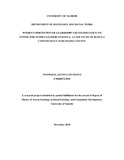| dc.description.abstract | Women constitute more than half of the world population and therefore their contribution to social and economic development is also more than half as compared to men by virtue of their dual roles in the productive and reproductive spheres. Despite the promulgation of a new constitution in Kenya in 2010, women still performed dismally only clinching 21% out of the 416 seats which is way below the given threshold of 30% in the constitution. In Kenya, socio-cultural, socio-economic and political factors still play a central role in influencing women’s perceptions of concepts such as leadership and may hinder the equal gender representation in government. This study therefore sought to understand how women perceive leadership and how their perceptions influence the current voting trends. Kenya’s vision 2030 advocates for gender mainstreaming as a project that serves to ensure the needs and interests of each gender are addressed. The findings in the research serve to sensitize the population of the challenges women face and device strategies to improve women participation in governance. The literature reviewed delved into the political, socio-cultural and socio-economic obstacles women face when they enter the political sphere. Leadership theories including the trait approach to leadership, behavioural and leadership style approaches, the contingency approach to leadership and the transformational leadership approach were also discussed. A discussion of women and political leadership in Africa and the role of the new constitution of Kenya 2010 is done. The feminist theory and the role of gender socialization is discussed under the theoretical framework.
Chapter three introduces the research methodology of the study. Both the qualitative and quantitative research methods were utilized in the study. In depth interviews with women
political leaders using open ended questionnaire as a tool were conducted to acquire qualitative data while structured questionnaires were administered to women inhabitants of Bumula constituency to acquire quantitative data. Chapter four presents the findings of the study as per the objectives of the study. Chapter five then confirms that sociocultural, socio-economic and political factors play a central role in women’s perceptions of leadership. The internalization of sex-stereo-typed assistant roles by women plays a central role in how women perceive leadership. These perceptions in turn influence the current voting trends of women where women shy away from entry into the political sphere. The study recommends for an inculcation of new culture that will eliminate false ideologies, intense capacity building of political parties and women. The researcher recommends further research on the impact of the constitution of Kenya 2010 in increasing women political participation, an evaluation of the role of political parties in
increasing women political participation and case studies of women politicians in Africa
and the world | en_US |

